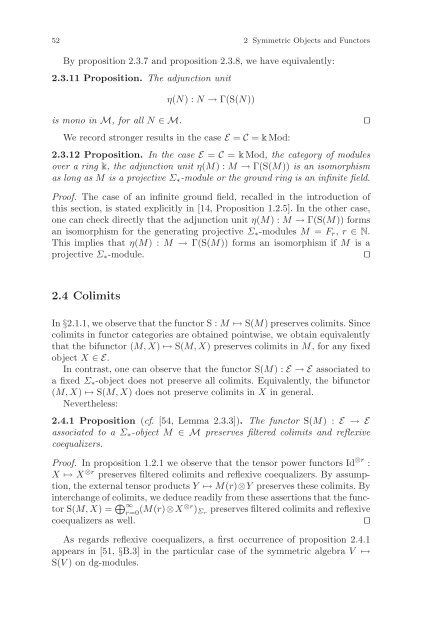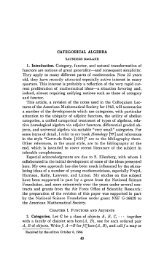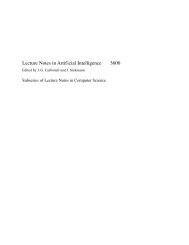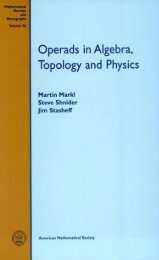Symmetric Monoidal Categories for Operads - Index of
Symmetric Monoidal Categories for Operads - Index of
Symmetric Monoidal Categories for Operads - Index of
You also want an ePaper? Increase the reach of your titles
YUMPU automatically turns print PDFs into web optimized ePapers that Google loves.
52 2 <strong>Symmetric</strong> Objects and Functors<br />
By proposition 2.3.7 and proposition 2.3.8, we have equivalently:<br />
2.3.11 Proposition. The adjunction unit<br />
η(N) :N → Γ(S(N))<br />
is mono in M, <strong>for</strong> all N ∈M. ⊓⊔<br />
We record stronger results in the case E = C = k Mod:<br />
2.3.12 Proposition. In the case E = C = k Mod, the category <strong>of</strong> modules<br />
over a ring k, the adjunction unit η(M) :M → Γ(S(M)) is an isomorphism<br />
as long as M is a projective Σ∗-module or the ground ring is an infinite field.<br />
Pro<strong>of</strong>. The case <strong>of</strong> an infinite ground field, recalled in the introduction <strong>of</strong><br />
this section, is stated explicitly in [14, Proposition 1.2.5]. In the other case,<br />
one can check directly that the adjunction unit η(M) :M → Γ(S(M)) <strong>for</strong>ms<br />
an isomorphism <strong>for</strong> the generating projective Σ∗-modules M = Fr, r ∈ N.<br />
This implies that η(M) :M → Γ(S(M)) <strong>for</strong>ms an isomorphism if M is a<br />
projective Σ∗-module. ⊓⊔<br />
2.4 Colimits<br />
In §2.1.1, we observe that the functor S : M ↦→ S(M) preserves colimits. Since<br />
colimits in functor categories are obtained pointwise, we obtain equivalently<br />
that the bifunctor (M,X) ↦→ S(M,X) preserves colimits in M, <strong>for</strong> any fixed<br />
object X ∈E.<br />
In contrast, one can observe that the functor S(M) :E→Eassociated to<br />
afixedΣ∗-object does not preserve all colimits. Equivalently, the bifunctor<br />
(M,X) ↦→ S(M,X) does not preserve colimits in X in general.<br />
Nevertheless:<br />
2.4.1 Proposition (cf. [54, Lemma 2.3.3]). The functor S(M) : E → E<br />
associated to a Σ∗-object M ∈Mpreserves filtered colimits and reflexive<br />
coequalizers.<br />
Pro<strong>of</strong>. In proposition 1.2.1 we observe that the tensor power functors Id ⊗r :<br />
X ↦→ X⊗r preserves filtered colimits and reflexive coequalizers. By assumption,<br />
the external tensor products Y ↦→ M(r)⊗Y preserves these colimits. By<br />
interchange <strong>of</strong> colimits, we deduce readily from these assertions that the functor<br />
S(M,X) = �∞ r=0 (M(r)⊗X ⊗r )Σr preserves filtered colimits and reflexive<br />
coequalizers as well. ⊓⊔<br />
As regards reflexive coequalizers, a first occurrence <strong>of</strong> proposition 2.4.1<br />
appears in [51, §B.3] in the particular case <strong>of</strong> the symmetric algebra V ↦→<br />
S(V ) on dg-modules.






